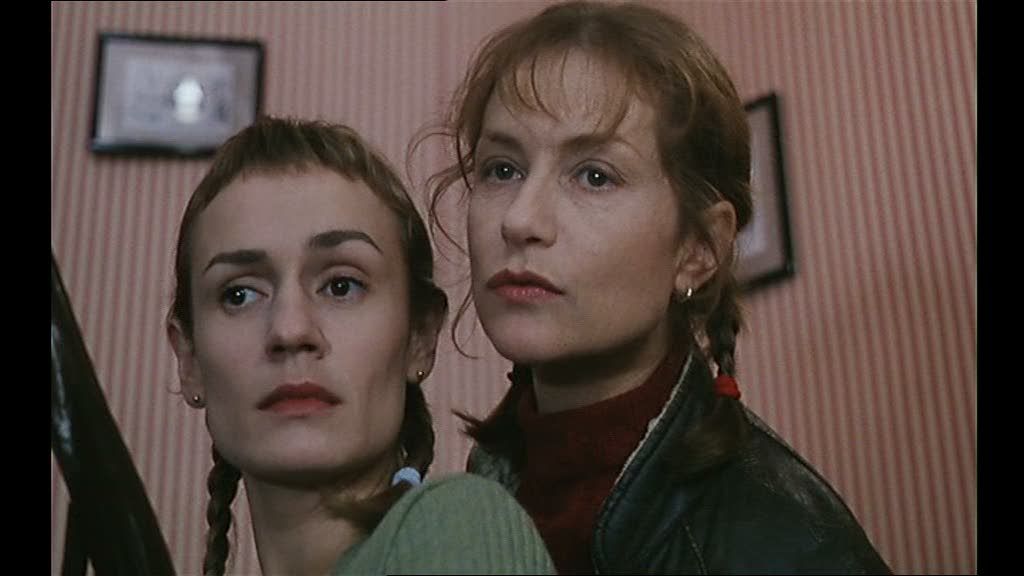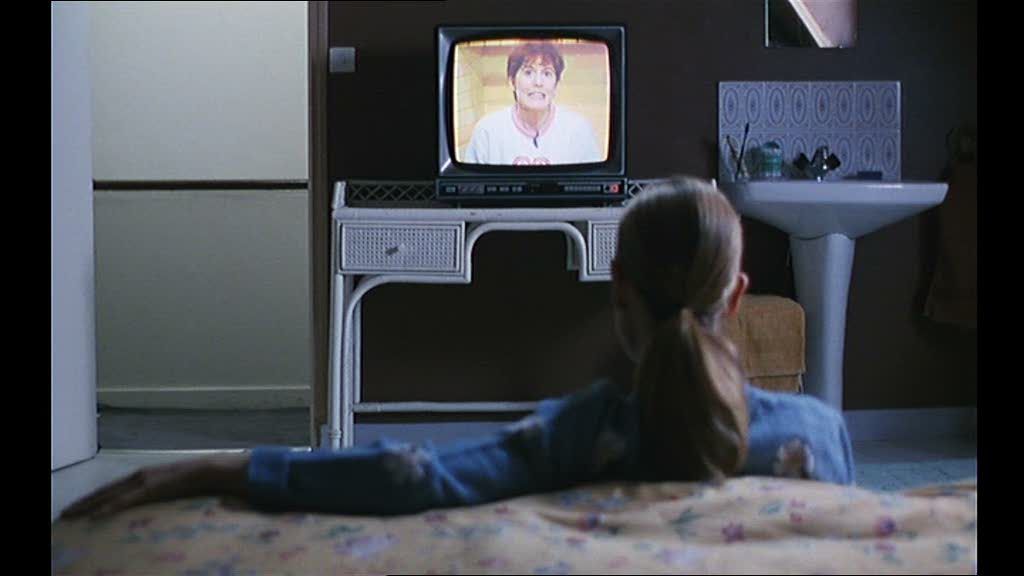
Claude Chabrol has always been especially interested in the dynamics of class power, examining the nature of class with a dry, caustic wit. In La cérémonie, this examination plays out in a remote small town where the isolated lower-class maid Sophie (Sandrine Bonnaire) is hired by the Lelievre family. They're a typical bourgeois family, aloof and condescending. The father, Georges (Jean-Pierre Cassel), is an authoritarian Mozart lover, and his wife Catherine (Jacqueline Bisset) is a slightly bitchy control freak, while their kids Melinda (Virginie Ledoyen) and Gilles (Valentin Merlet) are mostly just indifferent. These people aren't evil, they're just wrapped up in themselves, to the point that they virtually ignore Sophie once she's in their house. As Melinda says, they treat the maid like a "robot," but despite Melinda's enlightened pose, she's really no different than the rest of her family, elitist and snooty, at heart concerned only with her own problems.
For her part, Sophie is insecure and introspective, locked up inside herself. She has no hobbies or interests of her own, and her only activity is to drown herself in the glow of the TV screen. Melinda, always playing at the liberal role, says that her parents are trying to hypnotize the maid with the TV, suppressing her with it: the television as an instrument of bourgeois control. In fact, Chabrol presents the television as central to this bourgeois existence. Both classes watch the TV, though they use it in different ways. Early on, Gilles and Georges are experimenting with a new satellite TV set, changing channels so fast that each one is just a momentary flicker: they're not so much watching anything in particular as demonstrating the excess that their wealth has purchased, an overload of so many channels that it'd be impossible to ever watch them all. Later, when they finally do watch something in earnest, it's a performance of Mozart's Don Giovanni, with the whole family gathered on the couch, weighed down with a thick libretto and recording equipment and the father dressed up in a tuxedo as though he was actually going to the opera rather than watching it on TV. Chabrol even makes a joke at his own expense by having the Lelievre family watch his 1973 film Les noces rouges on the TV, Stephane Audran and Michel Piccoli clenching and plotting murder on the small screen; it's a suggestion that all films, no matter their content, can be subsumed as commercial, bourgeois entertainments.
Sophie is indiscriminate in her viewing, sitting down in front of the television's pale blue glow, illuminating her face in the dark of her room: she watches game shows and commercials and televised movies without ever seeming to care what's on the screen, as long as it's on. She doesn't even seem to know how to change the channels or operate any of the TV's for-her-daunting set of buttons. Often, she is joined by the local postmistress Jeanne (Isabelle Huppert), who's despised by the Lelievre family for her insouciant attitude and defiant bad manners. Jeanne is, in contrast to the tightly wound Sophie, a true free spirit, angry and flighty and goofy, as full of gossip and nasty words as Catherine herself. The two lower-class women bond over a shared violent past. They trade stories — Jeanne was responsible for the possibly accidental death of her own baby, while Sophie heavily implies that she murdered her father through arson — then collapse on Jeanne's bed giggling and tickling one another. They're like sinister sleepover pals, coming together based on their shared pain and isolation, and the shared impression that they are trampled on by the upper classes. As their relationship develops, they become inseparable, watching TV with arms wrapped around one another, bathed in the same blue glow that was once Sophie's solitary comfort. The way Chabrol constantly shoots them so close together, their faces pressed against one another, emphasizes their similarity, the resemblance in Bonnaire and Huppert's angular features and hard stares. Their relationship hints at a lesbian sexual undercurrent — especially at the climax, when Jeanne poses seductively against her friend, her stockinged leg lifted up at an angle — but mostly they seem to be becoming the same person, morphing together.

Chabrol observes all of this activity from his characteristic wry distance; the film's tone is flat and nearly affectless, and its small touches of humor are all the more surprising because of it. As Jeanne and Sophie grow closer, and the postmistress begins to inculcate the maid with her revolutionary, anti-bourgeois attitude, the tone around the Lelievre house begins to change. It's all about power games for Chabrol, about who's in control. Sophie's rebellion begins with a birthday party for Melinda, which she leaves after preparing all the food and getting everything ready. She'd told Catherine beforehand that she had somewhere to go, and her employer accepted it grudgingly, but when the moment actually comes and Sophie has the nerve to leave, Catherine feigns shock and outrage. It's as though the family doesn't really expect their servant to have her own life — Georges prefaces one conversation by telling Sophie that her life is her own and he doesn't want to intervene, then proceeds to forbid her from seeing Jeanne anymore. For Chabrol, class is power, and more than that class is freedom: Sophie's life is constrained and hemmed in merely because of her station.
In that respect, Sophie's dark secret, hinted at from early on, is a visible indication of her lower rank, her limited opportunities: she cannot read, and she proudly does anything she can to mask this humiliation, to prevent others from discovering her inability. This marks her out as an inferior in most interactions; it is a physical manifestation of her lower class and limited education. Chabrol is driving home, again and again, how class defines choice: even when Melinda accidentally gets pregnant, it doesn't destroy her life, not in the same way that Jeanne's life was changed by her pregnancy. In fact, the only one to truly suffer from Melinda's pregnancy is Sophie herself; the family shrugs off the revelation, knowing they have the means to deal with this problem however they choose.
La cérémonie is a dark and mordantly funny satire of class relations from one of the cinema's most persistent probers of class. As the film patiently peels back the layers of convention and artifice from class interactions, the tone gets steadily uglier and more bitter. Resentments and tensions boil over, and Chabrol once again tears apart bourgeois pretensions and the implicit hierarchies of bosses and employees.

9 comments:
"La Cérémonie is a dark and mordantly funny satire of class relations from one of the cinema's most persistent probers of class. As the film patiently peels back the layers of convention and artifice from class interactions, the tone gets steadily uglier and more bitter. Resentments and tensions boil over, and Chabrol once again tears apart bourgeois pretensions and the implicit hierarchies of bosses and employees."
Superb final paragraph there, which provides the defining coda. Wearing a tux for a television transmission of Mozart's DON GIOVANNI is one image that always stayed with me. But much like Kaurismaki's THE MATCH FACTORY GIRL, which has a plot quite similar to this film, the sudden and shocking violence leaves one numb on first viewing.
employees." But Chabrol (whose greatest film this may be; it's my personal favorite of his in any case) examines character and class as brilliantly as he has in his career, and in this film he's uncompromising. I also detected that lesbian undercurrent between Jeanne and Sophie, which of course adds to the intrigue.
"Class defines choice." Indeed.
Inadverently this is a version of the Papin sisters case -- immortalized by Genet in The Maids and Jean Vauthier and Nico Papatakis in Les Abysses
Thanks for the comments, Sam and David. Sam, I agree that this is one of Chabrol's best, a late masterpiece from the French New Wave great. And the ending violence, though I saw it coming, was still startling; it reminded me a bit of the impact at the end of the Fassbinder/Fengler collaboration Why Does Herr R. Run Amok?
"Le cérémonie" is a great, great controversial film of a genious whose name is Chabrol. I like too much this film and your faboulous blog, congratulations for a spanish cinema fan.
I like Chabrol especially "Le Boucher", "Que la bete meure" and "La Ceremonie' which I would not say it has a funny touch. But the point of the film is the hatred of low working people towards their "bosses'.
In my opinion it's not concerned about class conflict. It's more a story about two criminal souls who recognize each other from the first sight. They would be capable of killing anybody even poor people alike them. The film is a masterpiece. I think "L'enfer" its an underrated film of him.
Anyway your post examined this movie deeply.
If you want to know more about the Papin sisters , you should watch Les blessures assassines by Jean Pierre Denis. A great film !
dandylion
Did you see it in French?
Just wanted to add how great this post was -- I was especially fond of your take on the use of the television in the film. To be able to expound on a class conflict theme via the use of TV is just such a clever little conceit by Chabrol and you explain that perfectly here. Great stuff.
i think, there shouldn not be any limit for controlling ourselves .. everything must be free; although it was a cinema film.
Post a Comment